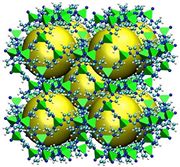Holon Physics Seminar, Fundamental and Optical Gaps from Density Functional Theory
Holon Institute of Technology, Faculty of Sciences
Fundamental and Optical Gaps from Density Functional Theory
Prof. Leeor Kronik, Weizmann Institute
January 22, 2015 | 13:00 | Seminar Room 424/8
 Abstract
AbstractAccurate prediction of both fundamental gaps and optical gaps, including charge transfer excitation energies is essential for rational theoretical design of novel molecules, materials and structures. Preferably, we would like to predict such quantities using density functional theory (DFT) - an approach to the many-electron problem in which the electron density, rather than the many-electron wave function, plays the central role.
This is because the relative computational simplicity afforded by DFT allows us to attack realistic problems. Unfortunately, despite many other successes, DFT has traditionally struggled with prediction of the above quantities. Specifically, research has been fraught with very difficult questions as to the extent to which spectroscopic conclusions can be drawn from DFT even in principle, followed by serious concerns as to the reliability of typical DFT approximations in practice.
Here, we present an approach that overcomes these difficulties quantitatively for finite systems, based on a range-split hybrid functional that uses exact long-range exchange. Its main novel feature is that the range-splitting parameter is not a universal constant but rather is determined from first principles, per system, based on satisfaction of the ionization potential theorem. A generalization to molecular solids is also presented.
This DFT approach mimics successfully, to the best of our knowledge for the first time, the quasi-particle picture of many-body theory. In particular, it allows for the extraction of both single- and two-particle excitations from ground-state DFT and linear-response time-dependent DFT calculation, respectively.



